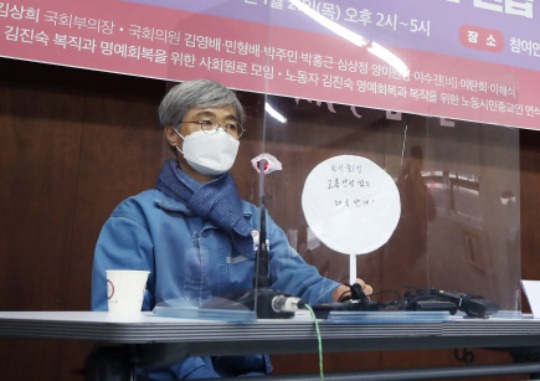Kim Jin-sook Marches to Cheongwadae, "The State Too Is Responsible for Unfair Layoffs"
이 글자크기로 변경됩니다.
(예시) 가장 빠른 뉴스가 있고 다양한 정보, 쌍방향 소통이 숨쉬는 다음뉴스를 만나보세요. 다음뉴스는 국내외 주요이슈와 실시간 속보, 문화생활 및 다양한 분야의 뉴스를 입체적으로 전달하고 있습니다.
[경향신문]

“We can’t put it off any longer. We urge the president, the government, Hanjin Heavy Industries, and the Korea Development Bank to acknowledge their responsibility and take immediate action.”
A debate was held to reinstate and restore the honor of Kim Jin-sook (61), an executive member of the Busan chapter of the Korea Confederation of Trade Unions who was laid off by Hanjin Heavy Industries, at the People’s Solidarity for Participatory Democracy in Jongno-gu, Seoul on January 21. The debate was co-organized by ten lawmakers from the ruling and opposition parties including vice speaker of the National Assembly Kim Sang-hee and civic groups. Kim Jin-sook, who passed her retirement age without being reinstated at the end of last year, is currently marching in protest from Busan to Cheongwadae wearing the blue uniform worn by the workers at Hanjin Heavy Industries. She argued, “I cannot retire without being reinstated.”
Father Song Gyeong-yong, head of social solidarity at Civil Society Organizations Network in Korea said, “The state was the party exerting state violence and provided the cause for the illegal and unfair layoffs. Yet it put off its responsibility by treating the problem as one between labor and management, between Kim and Hanjin Heavy Industries.” He continued and said, “The government must now, albeit belatedly, step forward with a mind to resolve a problem that it helped create.”
Hanjin Heavy Industries and the Korea Development Bank, the appointed receiver of the company, argue that paying wages and severance pay for the period during which the worker was laid off could be a breach of trust. Oh Dong-seok, a professor of law at Ajou University refuted this argument saying, “Reinstating a worker who was illegitimately laid off and paying the wages for the period which she was laid off is a legal act correcting the illegality.”
Kim Jin-sook described her forty years since she joined Hanjin Heavy Industries during the debate. She said, “I hope I don’t have to wait any longer to realize my dream of having a meal at the cafeteria that the union members and I fought to create and of visiting the factories where Bak Chang-su, Kim Ju-ik, Gwak Jae-gyu, and Choi Gang-seo (workers who died during the labor struggle at Hanjin Heavy Industries) worked.”
Kim was arrested and tortured at the police Anti-Communist Office for distributing flyers exposing the company union and the poor labor environment in February 1986, when she was a sixth-year welder at Daehan Shipbuilding Company (currently Hanjin Heavy Industries). In July that year, she was laid off for absence without leave after confronting an unfair personnel decision. A committee that reviewed the compensation and rehabilitation of pro-democracy activists twice recommended the company to reinstate Kim, but the company refused to respond.
Copyright © 경향신문. 무단전재 및 재배포 금지.
- 네이버, 소프트뱅크에 ‘라인’ 경영권 뺏길판…일본 정부서 지분 매각 압박
- “육군은 철수...우린(해병) 한다” “사단장님이 ‘하라’ 하셨다”···채 상병 사건 녹취록 공
- 민희진 대표 “무속인이 불가촉천민? 개인 사찰로 고소할 것”
- 나경원, ‘윤 대통령 반대’ 헝가리 저출생 해법 1호 법안으로···“정부 대책이 더 과격”
- 공수처, ‘이정섭 검사 비위 폭로’ 강미정 조국혁신당 대변인 조사
- “매월 10만원 저금하면 두 배로”…다음주부터 ‘청년통장’ 신청 모집
- 아동 간 성범죄는 ‘교육’ 부재 탓···사설 성교육업체에 몰리는 부모들
- [초선 당선인 인터뷰] 천하람 “한동훈은 긁어 본 복권…정치 리더로서 매력 없어져”
- 니카라과, “재정 악화” 이유로 한국 대사관 철수 통보
- 현대차, 차량 내부 20℃ 이상 낮춰주는 틴팅필름 개발…‘뙤약볕’ 파키스탄서 실증